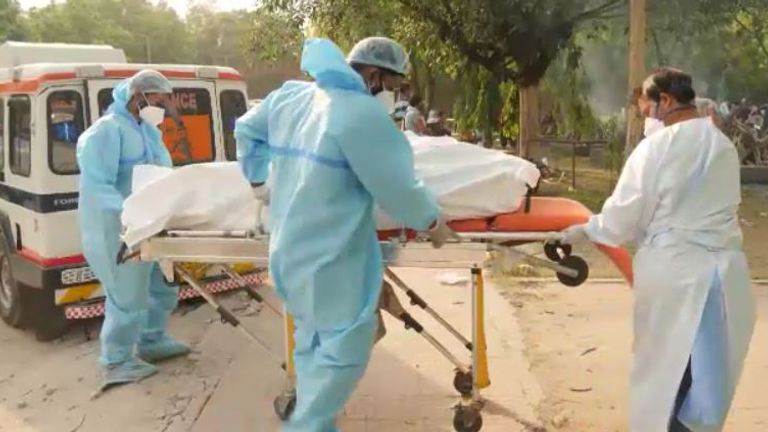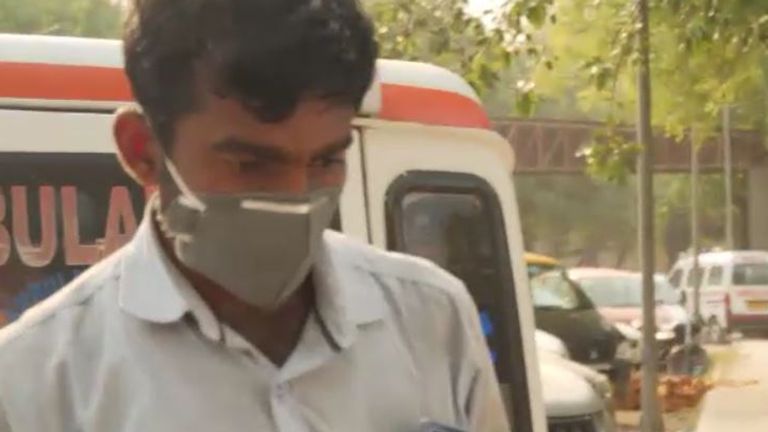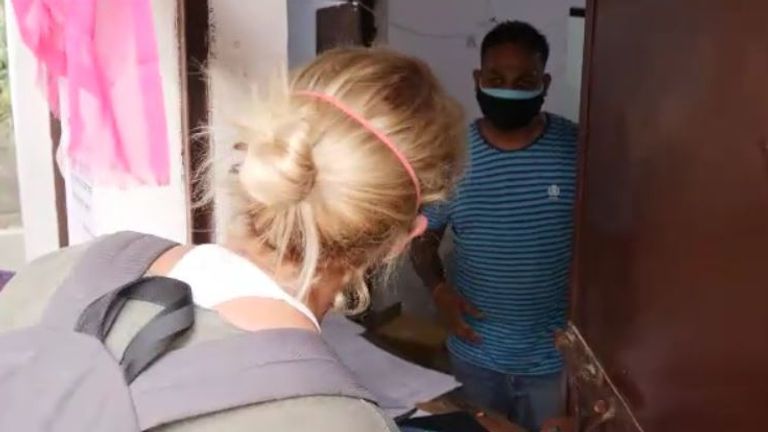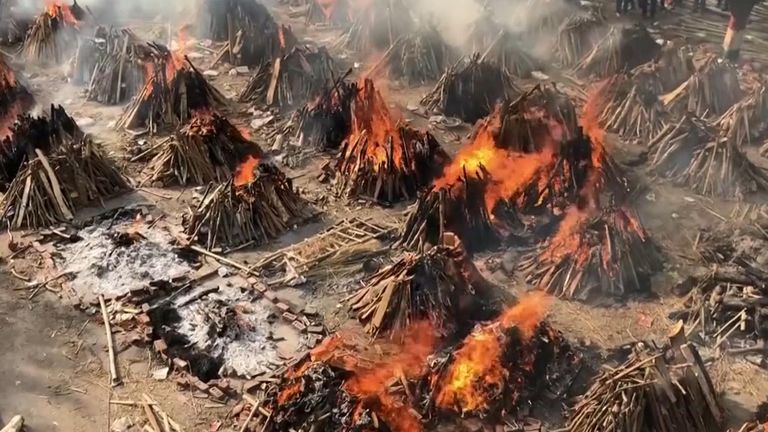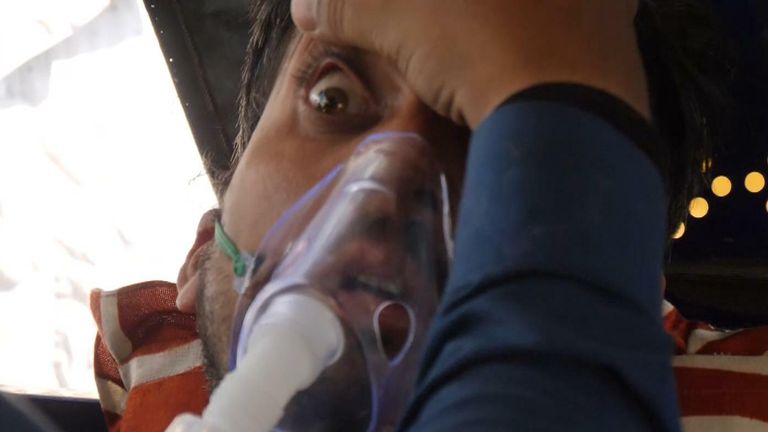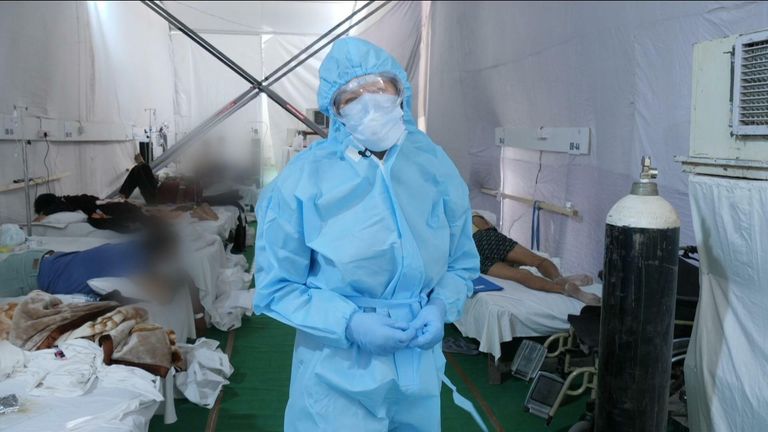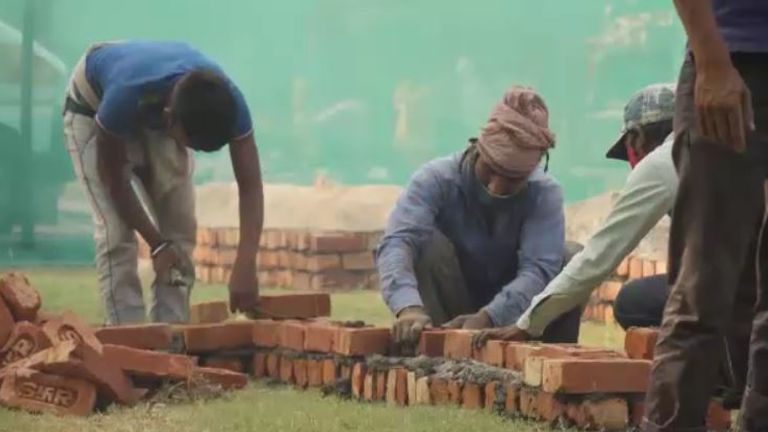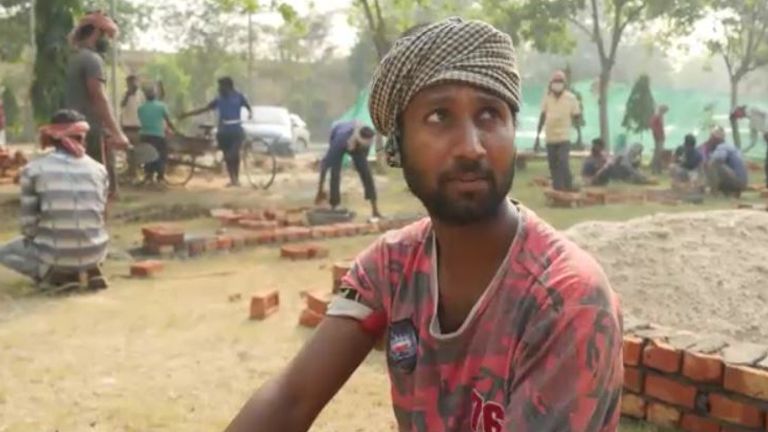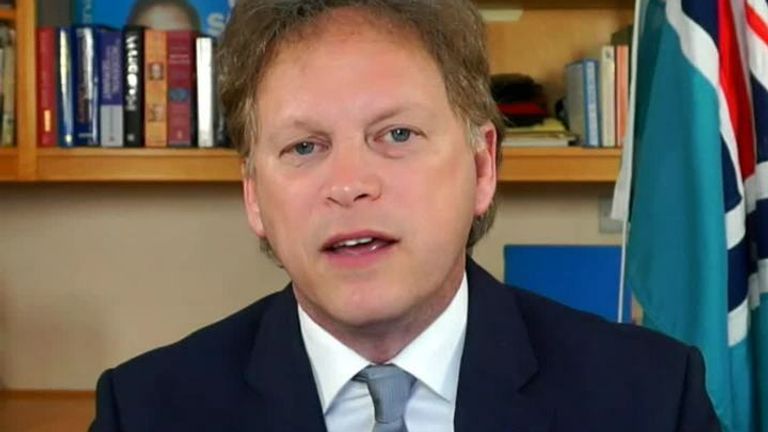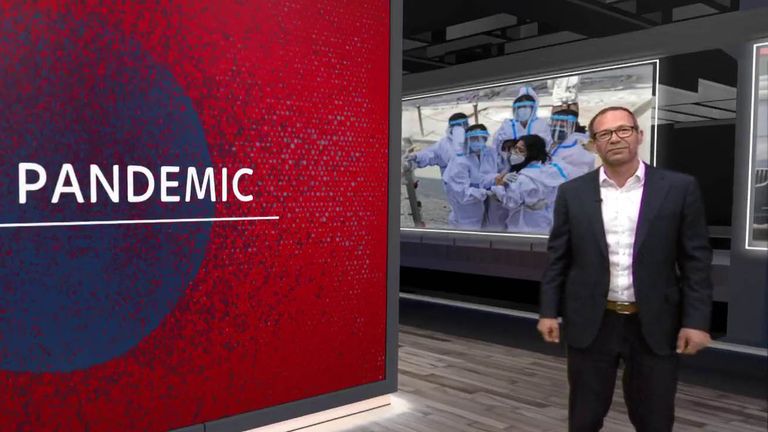There's growing concern that India's official tally of coronavirus deaths does not match what grieving relatives and others are seeing on the ground.
India has continued to post alarmingly high global record numbers of coronavirus cases, with more than 300,000 every day for the past week.
But its deaths are still low in comparison to its huge one-billion-plus population (around 190,000 deaths since the start of the pandemic).
We've visited a number of crematoriums over the past few days - in Delhi, and in Ghaziabad in neighbouring Uttar Pradesh.
In both places we found what appeared to be underreporting of the number of bodies coming into the crematoriums for funerals.
In around one hour in the Electric Crematorium in east Delhi we counted at least 30 active or prepared pyres with bodies entombed underneath the wood. Several ambulances transporting bodies arrived whilst we were there.
We spotted a single ambulance with five bodies stacked inside it. One ambulance driver from a private hospital said he was transporting "10 to 12" bodies daily - from just one of the Indian capital's hospitals.
Yet when we inquired about how many deaths were registered that day, we were told 20. The figure was a miscalculation for just the hour that we were there, never mind the entire day.
Delhi death rates are hovering around the 400 mark per day, but many we spoke to - as well as other commentators - seem convinced the numbers are far higher.
COVID-19: Why India's COVID spike means the world has to wait for its jabs
One mourner, Amit Kaushik, told us: "The Delhi government says that 380 peoples are dying every day from coronavirus but it's actually around 1,000… more than 1,000."
The general secretary of the Association of Health Service Doctors, West Bengal, told the UK's Observer newspaper: "The figures on COVID infections that the government is releasing are actually an underestimate."
Dr Manas Gumta went on: "A huge suspected COVID-positive population is certainly staying away from the tests. I believe the actual number of people dying of COVID is two to three times higher than what the government is reporting."
In Uttar Pradesh, our researchers counted about 25 bodies awaiting funerals at the Hindon crematorium in Ghaziabad and another eight which were lit.
Whilst inquiring about the official tally, the person in charge insisted they were dealing with only about six funerals daily on average.
When our researcher challenged him on this, he was informed, "we've been told to give that (lower) number by higher authorities".
We have repeatedly tried to reach the capital's municipal authorities, and the Indian government insists figures are all faithfully recorded and without interference.
A Twitter video doing the rounds in India shows furious relatives apparently attacking hospital workers after one of the family died from coronavirus before a bed could be found.
A second shows the floors of a hospital corridor splattered with blood after the fracas when health workers were apparently beaten by the same unnamed relatives.
There is much anger throughout the country as the nation struggles to cope with this deadly virus ripping through its people, and which is bringing its health service to its knees.
The scarcity of beds, the acute shortage of basic supplies like oxygen, the rampant black marketing as vital medicines double and triple in price is straining the faith of people who are reeling from the ferocity of this pandemic.
The west Delhi private hospital we visited a day ago, the Aakash Health Care Super Speciality Hospital, put out a red flag about its oxygen supplies.
Every doctor we spoke to there told us of their concern about oxygen supplies and how they were living on tenterhooks about when they would need to source more.
It is this desperate search for such a basic commodity of life which has enraged Indians and left them questioning and challenging the government's preparedness for this second surge.
Now, as they struggle to find places to bury their dead, as they roam around their capital trying to find a crematorium where they can cremate their loved ones and pay their last respects, they're starting to also question the accuracy of death statistics which do not seem in sync with their own experiences.
"There's no hospital beds available," said Amit Kaushik.
"And now for cremation, we searched two or three but there are no spaces… and finally we came here and we've been waiting for the last two or three hours… just for a space."
A graveyard worker who's been working on the ground, extending the crematorium by a hundred plots, told us he had observed multiple bodies and multiple funerals.
"So many people are dying and brought here," he told us. "Daily, at least 250 to 300 bodies are brought here… we see it."
There is a searing shock over the suddenness of all this and the country's citizens are in the midst of the whole world's worst nightmare about this pandemic.
"Eighty per cent of the deaths are due to the medical negligence here," one mourner who's lost five relatives to COVID told us.
Nishant Wadhwan said: "What I have realised is, we could have saved our relatives. They were in hospital and they did not get the proper care that they wanted because of the lack of oxygen, lack of medicines, lack of injections… and people are dying here."
And just why this has happened will be down to the Indian authorities to answer.
https://news.google.com/__i/rss/rd/articles/CBMihgFodHRwczovL25ld3Muc2t5LmNvbS9zdG9yeS9pbmRpYS1jcmVtYXRvcml1bXMtdW5kZXJyZXBvcnRpbmctYm9kaWVzLWFzLXN1c3BpY2lvbi1ncm93cy1vdmVyLXRydWUtbnVtYmVyLW9mLWNvcm9uYXZpcnVzLWRlYXRocy0xMjI4ODgyONIBigFodHRwczovL25ld3Muc2t5LmNvbS9zdG9yeS9hbXAvaW5kaWEtY3JlbWF0b3JpdW1zLXVuZGVycmVwb3J0aW5nLWJvZGllcy1hcy1zdXNwaWNpb24tZ3Jvd3Mtb3Zlci10cnVlLW51bWJlci1vZi1jb3JvbmF2aXJ1cy1kZWF0aHMtMTIyODg4Mjg?oc=5
2021-04-27 20:51:06Z
52781548061220
